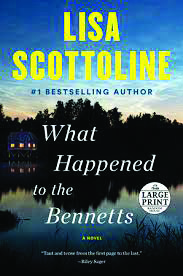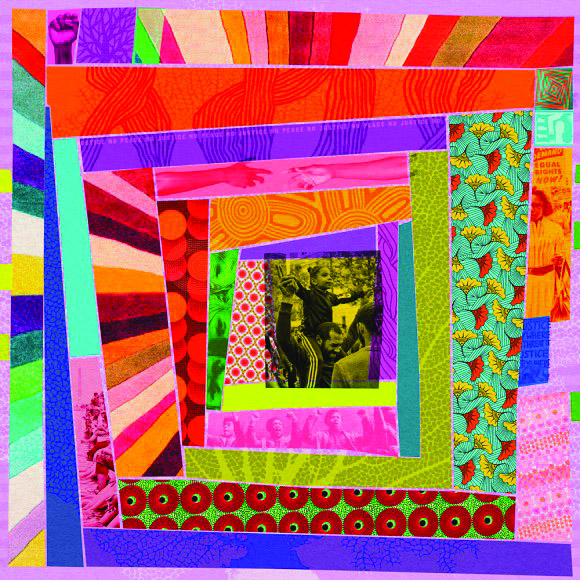What Happened to the Bennetts, by Lisa Scottoline (G.P. Putnam’s Sons, 400 pages)
Most people have heard of the federal witness protection program; far fewer have ever actually given it any serious thought. Those who have might know its acronym, WITSEC for witness security, and that it is a program of the U.S. Marshals Service that gives new identities to people who testify against criminals who have networks that enable them to retaliate.
According to the government’s website, more than 19,000 people have taken part in the program since its formation some 50 years ago. That includes not just people who testify but also any dependents who might be in danger.
Lisa Scottoline dives into this world with her new novel, which probes the hellscape one family endures after a violent carjacking. Up until this point, Jason and Lucinda Bennett had enjoyed a comfortable suburban life — replete with a Mercedes sedan, two nice teens and a small white dog with two speeds: “asleep and annoying.” But driving home after their daughter’s field hockey game, they were cut off by two men, which started a cascade of horrific events that led up to FBI agents banging on their door later that night.
The agents informed the already reeling family that they were in imminent danger because they had witnessed one of the carjackers shoot the other. They had 15 minutes to decide whether to enter the witness security program or to stay home and risk their own deaths.
That in itself is worth some reflection. Many people have thought through what they would take to leave their house for an emergency, such as a wildfire or hurricane; that’s why “bug out” bags are a thing. But this wasn’t just bugging out. The Bennetts had 15 minutes to gather belongings with the realization that they were never coming back, and in fact, they would never even be “the Bennetts” anymore after they left. Moreover, they weren’t allowed to tell anyone they were leaving — not Jason’s employees, not Lucinda’s friends or even her mother, who lived in a nursing home for the memory impaired.
As such, it wasn’t quite as easy a decision as it seemed.
The Bennetts do leave, however, and that’s not a spoiler; the title tells us as much. And although they are not allowed to go to their social media accounts on the new laptops the U.S. taxpayers give them, Lucinda uses an old account to see what’s being said about their disappearance. This makes it even harder, of course, seeing a thread called “What happened to the Bennetts” and a search being organized by citizen investigators, much like what happened in the real-life case of Gabby Petito and Brian Laundrie last year.
Moreover, by seeing what was said on the internet, the couple can see the rampant speculation that is taking place, such as whether Jason killed his family and then burned down the house and his office.
All this is fascinating enough, but eventually the story turns into a more conventional crime novel, enabled because Jason, as a court reporter, knows how to read lips, and learns something about the criminal he is hiding from that he wasn’t supposed to know.
From there the story accelerates, going back and forth between Jason’s quest for justice and the frenzied search for answers within the community they left behind.
It would be a mistake to call this a nail-biter; the novel is not as accomplished as that, although it certainly qualifies as a run-of-the-mill thriller. Scottoline, a columnist for the Philadelphia Inquirer, has somehow found the time to write 32 novels in addition to non-fiction books of humor, including Why My Third Husband Will Be a Dog. She also writes humor with her daughter, Francesca Serritella.
There’s little humor in this story, however, and in fact, the opening sequence of events will be disturbing to anyone who is a parent. It’s an emotional haul for the reader to move past what happens to fully embrace the thriller mode.
What Happened to the Bennetts is being praised by some as Scottoline’s best novel yet, which does not make me want to rush to get the others. It’s an excellent beach read, a few months early and a hundred pages too long. B-
Book Notes
Looking for new releases in gardening, I came across a term I hadn’t heard before: survival gardening. Apparently, this is a subset of doomsday prepping that has been a thing since long before Joe Biden warned us that Ukraine-related food shortages are coming.
`Until the seed shortage hits, you might be interested in some more traditional titles as we wait for the growing season to start. Out this month is Gardening for Everyone (Harvest, 304 pages) by sustainability expert Julia Watkins, who focuses on vegetables, fruits and herbs.
If you’re more into flowers, there’s Garden Maker (Harvest House, 208 pages) by Christie Purifoy. The Healing Gardenby Juliet Blankespoor is out this week (Harvest Press, 448 pages) and is a comprehensive guide to growing therapeutic plants. Next week comes Containers in the Garden (Cool Springs Press, 176 pages) by “celebrity gardener” Claus Dalby, who is apparently the Scandinavian Martha Stewart.
But for sheer reading enjoyment about gardens with none of the actual work, look for Marta McDowell’s Unearthing the Secret Garden (Timber Press, 320 pages), which explores the life and gardening history of Frances Hodgson Burnett, the author of the beloved children’s classic.
The opening: “Can a book be a horticultural trigger? A sort of gateway drug for gardeners? If so, then surely The Secret Garden by Franches Hodgson Burnett is a contender.”
McDowell, who teaches at the New York Botanical Garden, has also written horticultural histories of sorts about other writers, to include Emily Dickinson and Beatrix Potter, is the author of 2016’s All the Presidents’ Gardens (Timber Press, 336 pages), a history of White House gardens — “from Madison’s cabbages to Kennedy’s roses” — that sounds infinitely more interesting than foraging for seeds. — Jennifer Graham
Book Events
Author events
• AN EVENING TO REMEMBER: CONVERSATIONS WITH CONCORD-AREA AUTHORS Authors Margaret Porter, Virginia MacGregor (Nina Monroe), Paul Brogan and Mark Okrant, in conversation with NHPR’s Laura Knoy. Presented by The Duprey Companies. Bank of NH Stage, 16 S. Main St., Concord. Wed., April 6, 7:30 p.m. Free to attend. Visit ccanh.com.
• MAGGIE SHIPSTEAD Author presents The Great Circle. Virtual event hosted by Gibson’s Bookstore in Concord. Wed., April 13, 6 p.m. Registration required. Visit gibsonsbookstore.com or call 224-0562.
• EMMA LOEWE Author presents Return to Nature: The New Science of How Natural Landscapes Restore Us, in conversation with author Hannah Fries. Virtual event hosted by Gibson’s Bookstore in Concord. Wed., April 13, 7 p.m. Registration is required. Held via Zoom. Visit gibsonsbookstore.com or call 224-0562.
• MARIE BOSTWICK Author presents her new book The Restoration of Celia Fairchild. Bookery, 844 Elm St., Manchester. Fri., April 15, 5:30 p.m. Visit bookerymht.com or call 836-6600.
• BECKY SAKELLERIOU AND HENRY WALTERS Becky Sakelleriou presents The Possibility of Red. Henry Walters presents Field Guide A Tempo. Sat., April 16, 9:45 to 11:45 a.m. Peterborough Town Library, 2 Concord St., Peterborough. Visit monadnockwriters.org.
• ANNE HILLERMAN Author presents The Sacred Bridge. Virtual event hosted by Gibson’s Bookstore in Concord. Tues., April 19, 7 p.m. Held via Zoom. Registration is required. Visit gibsonsbookstore.com or call 224-0562.
• BRANDON K. GAUTHIER Author presents Before Evil: Young Lenin, Hitler, Stalin, Mussolini, Mao, and Kim. Gibson’s Bookstore, 45 S. Main St., Concord. Wed., April 27, 6:30 p.m. Visit gibsonsbookstore.com or call 224-0562.
Poetry
• REBECCA KAISER Poet presents Girl as Birch. Virtual event hosted by Gibson’s Bookstore in Concord. Mon., April 11, 7 p.m. Held via Zoom. Registration is required. Visit gibsonsbookstore.com or call 224-0562.
• DOWN CELLAR POETRY SALON Poetry event series presented by the Poetry Society of New Hampshire. Monthly. First Sunday. Visit poetrysocietynh.wordpress.com.
Writers groups
• MERRIMACK VALLEY WRITERS’ GROUP All published and unpublished local writers who are interested in sharing their work with other writers and giving and receiving constructive feedback are invited to join. The group meets regularly; the next meeting is scheduled for Tues., April 5, from 5 to 7:15 p.m., and will be held virtually over WebEx Meetings. To reserve your spot, email pembrokenhtownlibrary@gmail.com.
Writer submissions
• UNDER THE MADNESS Magazine designed and managed by an editorial board of New Hampshire teens under the mentorship of New Hampshire State Poet Laureate Alexandria Peary. features creative writing by teens ages 13 to 19 from all over the world, including poetry and short fiction and creative nonfiction. Published monthly. Submissions must be written in or translated into English and must be previously unpublished. Visit underthemadnessmagazine.com for full submission guidelines.






